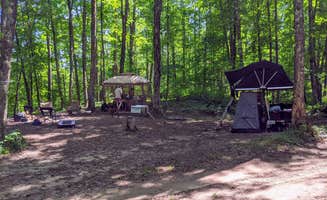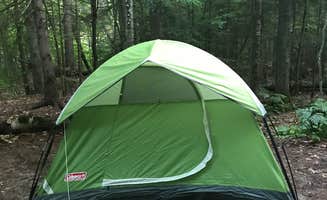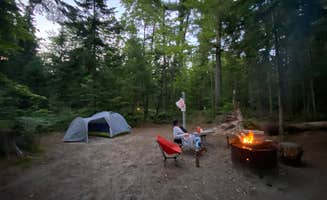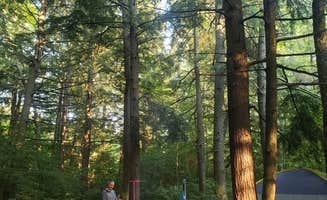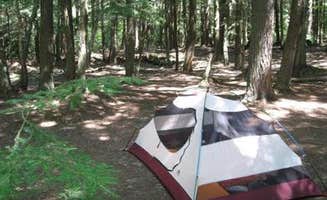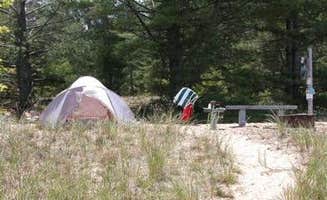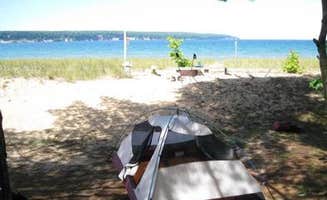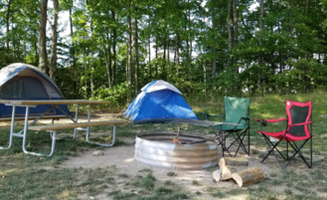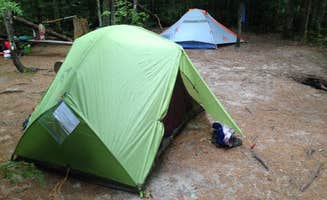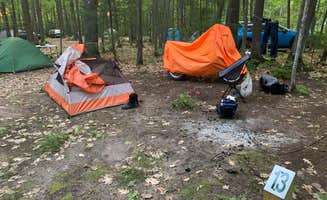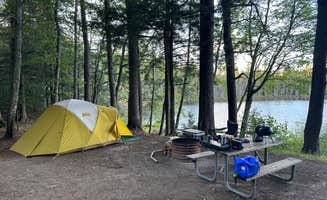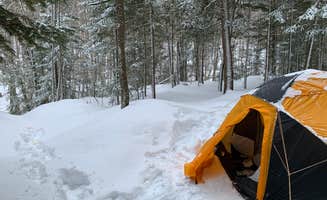Dispersed camping opportunities near Trenary, Michigan include several rustic sites within Hiawatha National Forest approximately 15-20 miles from town. Winter camping in this region often requires snowshoes for access, with temperatures regularly dropping below 15°F. The area features both inland lakes and Lake Superior shoreline access points with varying permit requirements depending on location.
What to do
Hike Bruno's Run Trail: Access this 9-mile loop trail near Ewing Point Rustic Campsite, which offers two trail access points near the parking area. The trail is primitive in sections and includes a narrow footbridge. One camper noted it's a "Quiet, secluded campsite on McKeever Lake. Very large site with a pit toilet nearby."
Paddle between connected lakes: Set up at Ironjaw Lake Dispersed Campsite for water access to multiple bodies of water. "Great site located between two lakes," reports one visitor, while another adds, "We did have to clear a bunch of down trees to get down the road but we had the site and the lakes to ourselves."
Winter snowshoeing: Backcountry sites at Pictured Rocks National Lakeshore remain open for winter camping. One adventurous camper explains, "Traveling in the winter by snowshoes requires more planning and skill. We brought a sled and embraced the weather. Did see a few large bear prints on the way to the bear canister."
What campers like
Beach access: Many campsites feature direct water access. At Duck Lake Campsites on Grand Island, campers enjoy "Right along a beach and very relaxing! Beautiful sunset opportunities and on a clear night you can see plenty of stars. Bear box and pole to keep food safe and a lot of blueberries around when in season!"
Secluded sites: The islands offer more privacy than mainland camping. On Grand Island, the Gamefence Campsite provides "Room for several tents and space to be comfortable with a little bit of privacy. Bring your bear proof food containers and copious amounts of bug spray."
Varied terrain: Backpackers appreciate the range from inland forest to dramatic shoreline. At Pictured Rocks National Lakeshore Backcountry Sites, one hiker shared, "The sites were very nice with so much space. We stayed at potato patch (which had so many mosquitoes!) Chapel site with beach access and cliffs site which had a pretty far hike to get to it."
What you should know
Navigation challenges: Some dispersed sites can be difficult to locate. At Ironjaw Lake, one camper advised, "Your best directions will come from locating the site on your GPS (in our case Google Maps) and dropping a pin. That took us straight to the location no problem."
Seasonal restrictions: Many areas have different rules based on time of year. A camper at Loon Call Campsite On Grand Island noted the site has "Small beach, comfortable campsite with space for 2 or 3 tents. Bear storage bin and drinking water."
Varying beach conditions: Lake Superior shorelines range from sandy to rocky. The Lake Superior Beachfront dispersed sites are tricky: "This place is tricky to find and I would suggest keeping a low profile. I didn't have problems but others have said locals don't like people camping here."
Tips for camping with families
Choose shorter hiking options: For those with children, certain sites require less trekking. One reviewer recommended, "Little Beaver Lake Backcountry...is another easy-hike site located in the park. The site is situated not along Lake Superior, but Little Beaver Lake. This site is great for first timers or individuals seeking a mild hike."
Plan for ferry logistics: Grand Island requires a boat ride, which affects your packing strategy. At Channel Marker Campsite On Grand Island, a camper noted it's "the perfect distance (about a half mile on a well maintained flat trail) from the ferry dock and could be accessed by water too!"
Bring proper insect protection: Bug nets are essential beyond just spray. A camper warned about Grand Island: "The bugs (mosquitoes and flies) are horrendous! Even with strong deet spray. Good idea to invest in the bug net gear the ferry service recommends!"
Tips from RVers
Limited RV options: Most tent campsites near Trenary cater exclusively to tent camping, with few RV accommodations. Ironjaw Lake is one exception that accommodates smaller RVs, but requires caution: "We did have to clear a bunch of down trees to get down the road."
Winter considerations: RV camping in winter requires significant preparation. As one winter camper noted, "The weather dumped lots of snow constantly and the winds never stopped howling."
Road conditions: Many forest roads leading to dispersed sites aren't maintained for larger vehicles. A camper reported, "We started to get a strange feeling...finally, we turn onto the road that it is on, just a ways down, and the stop sign is filled with bullet holes."


